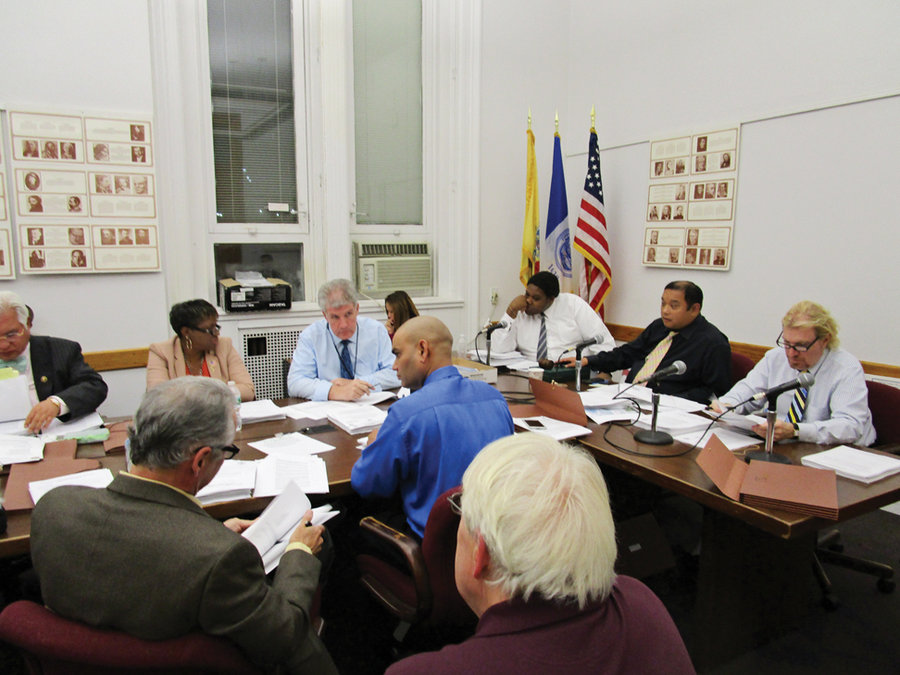The City Council approved an ordinance in mid-December that will eventually allow a parking lot near the Municipal Court building to be sold to a residential developer. However, the municipal workers’ union is upset, as their contract requires parking to be provided for them.
The ordinance, adopted on Dec. 18, lifts a deed restriction on the Summit Avenue parking lot to allow it to be used for redevelopment. The ordinance takes advantage of a change in state environmental regulations that in the past prohibited redevelopment of parking lots for residential uses.
The vote occurred over the objections of council members Richard Boggiano and Michael Yun.
The vote was the first step in eventually conveying ownership of the property to the Jersey City Redevelopment Authority for eventual sale to Vaishno Ma Summit, LL, a private developer, who will build between 55 to 65 market rate luxury residential rental units there.
The ordinance also ends parking for municipal workers after the 18 months of construction are over.
“The new building will enhance the neighborhood and the city will see about $150,000 in taxes.” – Donald Pepe, developer’s attorney
____________
Council President Rolando Lavarro said there are alternatives for relieving parking issues, such as construction of a new parking deck on other city-owned property that exists behind the municipal court. This might be accomplished, he said, by using a portion of proceeds from the sale of the land.
Yun said the parking lot should be used to benefit the neighborhood in a similar way as does the parking lot behind the Parking Authority headquarters on Central Avenue, allowing residents of the area to park there overnight.
Negative impact on court and neighborhood
Boggiano said the plan would have a negative impact on an area already desperate for parking. He also said it would increase problems for police and others who have to testify at the court.
At the meeting, union member Edward Meane presented a petition from Local 246 of the court workers union containing signatures of 76 employees opposing the move.
“If this project moves ahead parking will be lost,” Meane said. “What provisions are being made to provide parking?”
He predicted the measure will likely result in the union filing a grievance and another lawsuit. He said this isn’t just about the court employees, but police, city inspectors, and others who have to attend court for a variety of reasons, and will lack parking.
Jude Anthony Tiscornia, a public defender for the city, called the move short-sighted.
“The sale of the land will hinder the fair administration of justice,” he said. “There is no parking on the street now, and I can only imagine how much worse it will be if you throw another 100 vehicles on the street.”
The city’s contract with the union says that the city has to provide parking. While there are negotiations for a new contract, he said, the city is obligated to honor the old contract.
Some residents dislike the plan
Yvonne Balcer, community activist, said the Summit Avenue parking lot is used by people in the neighborhood at night.
“The city is constantly taking land and not replacing parking areas,” she said. “People have cars, and this is one way for people in that neighborhood to park. The city should be creating parking, not getting rid of it.”
The sale will require another ordinance officially allowing the JCRA to officially sell the land to Vaishno Ma Summit, LLC. After that, the council must finalize the deal through adoption of a third ordinance.
Some like the idea
Not all of the speakers at the Dec. 18 meeting were opposed to the redevelopment.
Louis Miribal said the project would help bolster property values and increase the tax base by putting the property onto the tax rolls. It would also create jobs.
Jose Navarez said the area south of Journal Square is a nice area but it is also run down. He pointed out that until recently, the construction boom in Jersey City has been mostly in the downtown area.
“People around Journal Square have been patient for years,” he said. “We want an area that is safe to walk around in, and this will help improve the area.”
Several construction union members spoke out in favor of the project, saying it will generate jobs.
Donald Pepe, an attorney from the firm Scarinci & Hollenbeck, representing the potential developer, said there are a number of other parking lots in the area that are under capacity. He said a parking deck for another property would more than make up for the loss in the area. The project itself will provide the parking required under development regulations but for the new building’s residents, not the court workers or neighbors.
“The new building will enhance the neighborhood and the city will see about $150,000 in taxes,” he said. He provided a petition with signatures of people in the neighborhood supporting the project.
Councilwoman Diane Coleman said the deal makes sense.
“This will put property back on the tax rolls, bring money to the city from the sale and create taxes,” she said. “Journal Square has a lot of homeless people. This will help improve the area.”
Al Sullivan may be reached at asullivan@hudsonreporter.com.
